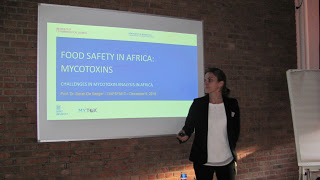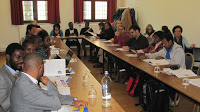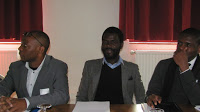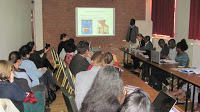8-9 December 2016. Gent, Belgium. a specific session was dedicated to mycotoxins as an important symposium of the Ghent Africa Platform – GAPSYM10: Demonstrating the value of international collaboration on teaching and research.
food safety issue in Africa at the
Food Safety takes a prominent role in the Food Security problem. Mycotoxins, toxic fungal secondary metabolites, are one of the main food safety threats currently encountered in Africa. Aflatoxins for instance cause liver cancer, while aflatoxins and fumonisins are related to stunting in African children (IARC, 2015). Co-occurrence of
multiple mycotoxins in one crop as well as effects of climate change make this research field complex. The mycotoxin problem needs to be tackled in a multi-disciplinary way primarily focusing on prevention measures, but also mycotoxin analysis for monitoring and control purposes is definitely needed.
At Ghent University Association, the MYTOX research group (www.mytox.be), organized short training initiatives (VLIR-UOS STI) on mycotoxin analysis
including lectures by MYTOX experts on prevention, reduction and health effects of mycotoxins in the years 2012, 2013 and 2014 for people from developing countries. Further, different research projects funded by FAO/WHO, VLIR-UOS and BOF have taken place or are ongoing in the last years with MYTOX researchers involved.
The developing countries suffer from several problems related to mycotoxin analysis. First, analytical tests are expensive, and there is a lack of expertise. Laboratories fail to maintain instruments leaving many of them just unused in the laboratories. Most pronounced is the lack of training in analytical methods as well as in use and trouble-shooting of the analytical equipment. The gap in capacity needs to be addressed.
Malawi. “UGent Redefining the Scope and Focus of Mycotoxin Screening in Food and Feed in Sub-Saharan Africa through Appropriate Training”
To ensure low levels of mycotoxins in the developed world, food is screened for a wide range of mycotoxins. To the contrary, in sub-Saharan Africa (SSA), the analyses are virtually limited to aflatoxins only. Laboratory of Food Analysis at UGent has been nurturing African researchers through doctorate training where thousands of samples from Africa have been analyzed. Results indicate that the food and feed samples were co-contaminated with an array of mycotoxins inspiring a shift toward broader multi-mycotoxin screening in order to guarantee food safety of food in SSA.
 |
| Add caption |
Niyibituronsa Marguerite, Rwanda Agriculture Board, Rwanda, Jomo Kenyatta University of Agriculture and Technology, Kenya and Olotu Ifeoluwa, University of Johannesburg, South Africa:
‘’Our Journey with AWARD and Key Messages on Her Women Empowerment Programs’’. The African Women in Agricultural Research and Development (AWARD) fellowship is an excellently prepared program that transforms the careers and research of women in the agricultural sector through the knowledge and the skills she provides. One of the programs involves the Advanced Science Training where fellows are attached to well-equipped laboratories under the supervision of renowned scientists to conduct gender responsive and adaptable research such as our research titled; ‘safety assessment of some traditionally fermented foods produced in Africa’ and ‘the effect of fermentation on aflatoxin levels and antioxidant activity of fermented soybean milk’. The AWARD fellowship sets the pace as an example of programs needed to transform the Agricultural sector in Africa.
François Stepman, PAEPARD, Belgium: “Bridging the research and development gap”
The Aflatoxin contamination of food and feed requires a development and research policy which translates research outcomes into practical ways which can bridge the gap between (a) research and the development of safe food and feed, and (b) different actors and (c) often parallel, initiatives.
 Dr. Marthe De Boevre, Ghent University, Belgium: ‘Sandwich PhD programs with African partners: challenges of ongoing research in the Laboratory of Food Analysis’
Dr. Marthe De Boevre, Ghent University, Belgium: ‘Sandwich PhD programs with African partners: challenges of ongoing research in the Laboratory of Food Analysis’Two PhD students, Cynthia Chilaka (Nigeria) and Melody Hove (Zimbabwe), are in currently performing part of their PhD research in their home country, and will submit a ‘testimonial movie’. Dr. De Boevre will discuss their challenges and struggles during their research work and will highlight the importance of the ‘sandwich’ system.
Source: PAEPARD FEED
by secretary
by secretary
by secretary
by secretary
by secretary
by secretary
by secretary
by secretary
by secretary
by secretary
by secretary
by secretary
by secretary
by secretary
by secretary
by secretary
by secretary
by secretary
by secretary
by secretary
by secretary
by secretary
by secretary
by secretary
by secretary
by secretary
by secretary
by secretary
by secretary
by secretary
by secretary
by secretary
by secretary
by secretary
by secretary
by secretary
by secretary
by secretary
by secretary
by secretary
by secretary
by secretary
by secretary
by secretary
by secretary
by secretary
by secretary
by secretary
by secretary
by secretary
by secretary
by secretary
by secretary
by secretary
by secretary
by secretary
by secretary
by secretary
by secretary
by secretary
by secretary
by secretary
by secretary
by secretary
by secretary
by secretary
by secretary
by secretary
by secretary
by secretary
by secretary
by secretary
by secretary
by secretary
by secretary
by secretary
by secretary
by secretary
by secretary
by secretary
by secretary
by secretary
by secretary
by secretary
by secretary
by secretary
by secretary
by secretary
by secretary
by secretary
by secretary
by secretary
by secretary
by secretary
by secretary
by secretary
by secretary
by secretary
by secretary
by secretary
by secretary
by secretary
by secretary
by secretary
by secretary
by secretary
by secretary
by secretary
by secretary
by secretary
by secretary
by secretary
by secretary
by secretary
by secretary
by secretary
by secretary
by secretary
by secretary
by secretary
by secretary
by secretary
by secretary
by secretary
by secretary
by secretary
by secretary
by secretary
by secretary
by secretary
by secretary
by secretary
by secretary
by secretary
by secretary
by secretary
by secretary
by secretary
by secretary
by secretary
by secretary
by secretary
by secretary
by secretary
by secretary
by secretary
by secretary
by secretary
by secretary
by secretary
by secretary
by secretary
by secretary
by secretary
by secretary
by secretary
by secretary
by secretary
by secretary
by secretary
by secretary
by secretary
by secretary
by secretary
by secretary
by secretary
by secretary
by secretary
by secretary
by secretary
by secretary
by secretary
by secretary
by secretary
by secretary
by secretary
by secretary
by secretary
by secretary
by secretary
by secretary
by secretary
by secretary
by secretary
by secretary
by secretary
by secretary
by secretary
by secretary
by secretary
by secretary
by secretary
by secretary
by secretary
by secretary
by secretary
by secretary
by secretary
by secretary
by secretary
by secretary
by secretary
by secretary
by secretary
by secretary
by secretary
by secretary
by secretary
by secretary
by secretary
by secretary
by secretary
by secretary
by secretary
by secretary
by secretary
by secretary
by secretary
by secretary
by secretary
by secretary
by secretary
by secretary
by secretary
by secretary
by secretary
by secretary
by secretary
by secretary
by secretary
by secretary
by secretary
by secretary
by secretary
by secretary
by secretary
by secretary
by secretary
by secretary
by secretary
by secretary
by secretary
by secretary
by secretary
by secretary
by secretary
by secretary
by secretary
by secretary
by secretary
by secretary
by secretary
by secretary
by secretary
by secretary
by secretary
by secretary
by secretary
by secretary
by secretary
by secretary
by secretary
by secretary
by secretary
by secretary
by secretary
by secretary
by secretary
by secretary
by secretary
by secretary
by secretary
by secretary
by secretary
by secretary
by secretary
by secretary
by secretary
by secretary
by secretary
by secretary
by secretary
by secretary
by secretary
by secretary
by secretary
by secretary
by secretary
by secretary
by secretary
by secretary
by secretary
by secretary
by secretary
by secretary
by secretary
by secretary
by secretary
by secretary
by secretary
by secretary
by secretary
by secretary
by secretary
by secretary
by secretary
by secretary
by secretary
by secretary
by secretary
by secretary
by secretary
by secretary
by secretary
by secretary
by secretary
by secretary
by secretary
by secretary
by secretary
by secretary
by secretary
by secretary
by secretary
by secretary
by secretary
by secretary
by secretary
by secretary
by secretary
by secretary
by secretary
by secretary
by secretary
by secretary
by secretary
by secretary
by secretary
by secretary
by secretary
by secretary
by secretary
by secretary
by secretary
by secretary
by secretary
by secretary
by secretary
by secretary
by secretary
by secretary
by secretary
by secretary
by secretary
by secretary
by secretary
by secretary
by secretary
by secretary
by secretary
by secretary
by secretary
by secretary
by secretary
by secretary
by secretary
by secretary
by secretary
by secretary
by secretary
by secretary
by secretary
by secretary
by secretary
by secretary
by secretary
by secretary
by secretary
by secretary
by secretary
by secretary
by secretary
by secretary
by secretary
by secretary
by secretary
by secretary
by secretary
by secretary
by secretary
by secretary
by secretary
by secretary
by secretary
by secretary
by secretary
by secretary
by secretary
by secretary
by secretary
by secretary
by secretary
by secretary
by secretary
by secretary
by secretary
by secretary
by secretary
by secretary
by secretary
by secretary
by secretary
by secretary
by secretary
by secretary
by secretary
by secretary
by secretary
by secretary
by secretary
by secretary
by secretary
by secretary
by secretary
by secretary
by secretary
by secretary
by secretary
by secretary
by secretary
by secretary
by secretary
by secretary
by secretary
by secretary
by secretary
by secretary
by secretary
by secretary
by secretary
by secretary
by secretary
by secretary
by secretary
by secretary
by secretary
by secretary
by secretary
by secretary
by secretary
by secretary
by secretary
by secretary
by secretary
by secretary
by secretary
by secretary
by secretary
by secretary
by secretary
by secretary
by secretary
by secretary
by secretary
by secretary
by secretary
by secretary
by secretary
by secretary
by secretary
by secretary
by secretary
by secretary
by secretary
by secretary
by secretary
by secretary
by secretary
by secretary
by secretary
by secretary
by secretary
by secretary
by secretary
by secretary
by secretary
by secretary
by secretary
by secretary
by secretary
by secretary
by secretary
by secretary
by secretary
by secretary
by secretary
by secretary
by secretary
by secretary
by secretary
by secretary
by secretary
by secretary
by secretary
by secretary
by secretary
by secretary
by secretary
by secretary
by secretary
by secretary
by secretary
by secretary
by secretary
by secretary
by secretary
by secretary
by secretary
by secretary
by secretary
by secretary
by secretary
by secretary
by secretary
by secretary
by secretary
by secretary
by secretary
by secretary
by secretary
by secretary
by secretary
by secretary
by secretary
by secretary
by secretary
by secretary
by secretary
by secretary
by secretary
by secretary
by secretary
by secretary
by secretary
by secretary
by secretary
by secretary
by secretary
by secretary
by secretary
by secretary
by secretary
by secretary
by secretary
by secretary
by secretary
by secretary
by secretary
by secretary
by secretary
by secretary
by secretary
by secretary
by secretary
by secretary
by secretary
by secretary
by secretary
by secretary
by secretary
by secretary
by secretary
by secretary
by secretary
by secretary
by secretary
by secretary
by secretary
by secretary
by secretary
by secretary
by secretary
by secretary
by secretary
by secretary
by secretary
by secretary
by secretary
by secretary
by secretary
by secretary
by secretary
by secretary
by secretary
by secretary
by secretary
by secretary
by secretary
by secretary
by secretary
by secretary
by secretary
by secretary
by secretary
by secretary
by secretary
by secretary
by secretary
by secretary
by secretary
by secretary
by secretary
by secretary
by secretary
by secretary
by secretary
by secretary
by secretary
by secretary
by secretary
by secretary
by secretary
by secretary
by secretary
by secretary
by secretary
by secretary
by secretary
by secretary
by secretary
by secretary
by secretary
by secretary
by secretary
by secretary
by secretary
by secretary
by secretary
by secretary
by secretary
by secretary
by secretary
by secretary
by secretary
by secretary
by secretary
by secretary
by secretary
by secretary
by secretary
by secretary
by secretary
by secretary
by secretary
by secretary
by secretary
by secretary
by secretary
by secretary
by secretary
by secretary
by secretary
by secretary
by secretary
by secretary
by secretary
by secretary
by secretary
by secretary
by secretary
by secretary
by secretary
by secretary
by secretary
by secretary
by secretary
by secretary
by secretary
by secretary
by secretary
by admin
by admin
by admin
by admin
by admin
by admin
by admin
by admin
by admin





